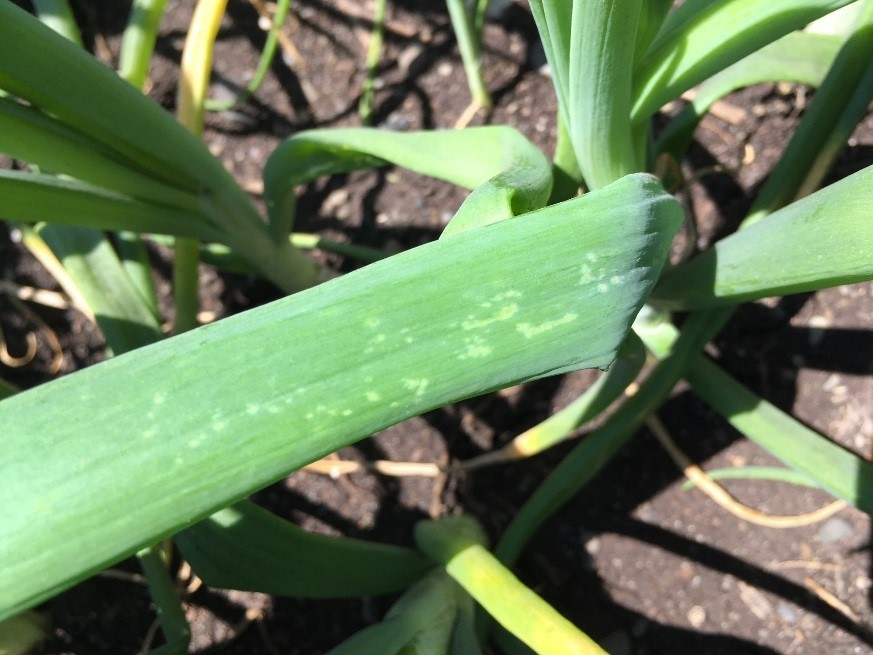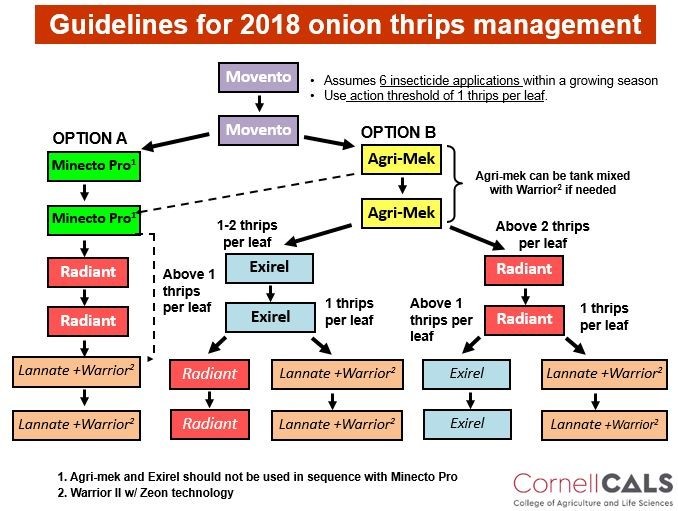Onion Thrips Management Recommendations for 2018
Ethan Grundberg, Vegetable Specialist
Eastern New York Commercial Horticulture

Most larger scale onion growers in the region are already familiar with Dr. Brian Nault's insecticide sequence recommendations for onion thrips management. However, more products have been registered in New York in the last few years that provide alternative options for conventional thrips management (specifically Exirel and Minecto Pro). It's worth keeping in mind that Dr. Nault's recommendations are based on two primary principles:
- Scouting and only spraying at threshold: The days of calendar sprays are long gone. Given the cost of some of the newer chemistries used for thrips management, growers must scout fields and confirm that thrips populations have reached a level of at least an average of 1 thrips per leaf before spraying. Spraying before thresholds are reached not only weakens the resistance management strategy (see point 2), but also cuts into grower profits by unnecessarily increasing the number of insecticide applications each year.
- Resistance management: Onion thrips produce multiple generations each year. They also develop resistance to insecticides more readily than other pests that reproduce more slowly. One of the goals of the recommended insecticide sequence is to avoid exposing multiple generations per year to the same insecticide. By avoiding the exposure of multiple thrips generations to the same active ingredients in the same year, growers can help preserve the useful life of insecticides that are effective at managing thrips.
The chart that follows outlines several different insecticide sequences developed by Dr. Nault for growers to follow depending upon the severity of thrips pressure in the field. It should be noted that, as indicated below, Minecto Pro is a pre-mix of the same active ingredients found in Agri-Mek and Exirel, so it should NOT be used in sequence with those products. Addtionally, almost all of the insecticides listed in the chart should be used with a non-ionic penetrating surfactant, such as Dyne-Amic or LI700. Only Warrior and Lannate are compatible with spreader-sticker type adjuvants. Since Bravo Weatherstik is formulated with a sticker, it should NOT be mixed with Movento, Minecto Pro, Radiant, Exirel, or Agri-Mek.
This article was published in the June 7th 2018, ENYCHP Vegetable News. Click here to view the full newsletter.


Upcoming Events
2026 Northeast Extension Fruit Consortium Winter Webinar Series
February 4, 2026 : Management of Up and Coming Strawberry Diseases in the Northeastern United States
Session 1: Management of Up and Coming Strawberry Diseases in the Northeastern United States
February 11, 2026 : Kiwiberry Production in the Northeast
Session 2: Kiwiberry Production in the Northeast
February 18, 2026 : Heat Mitigation- Sunburn and Fruit Coloring
Session 3: Heat Mitigation- Sunburn and Fruit Coloring
February 25, 2026 : The Dating Game- Updates in Lepidopteran Mating Disruption
Session 4: The Dating Game- Updates in Lepidopteran Mating Disruption
March 4, 2026 : USEPA Endangered Species Act Strategies and Pesticide Use
Session 5: USEPA Endangered Species Act Strategies and Pesticide Use
March 11, 2026 : Practical Drought Management for Fruit Growers
Session 6: Practical Drought Management for Fruit Growers
Managing the Invasive Swede Midge Webinar
March 6, 2026 : Managing the Invasive Swede Midge Webinar
Swede midge is an invasive fly that causes serious economic losses to brassica crops. Due to its small size and hidden feeding habits, swede midge is often called an "invisible pest" and damage may be misdiagnosed. In this webinar, we will review the swede midge life cycle and crop damage symptoms, current management recommendations, new research findings, and highlights from on-farm case studies with a focus on organic management.
New Farm Manager Skills Day - Get the Tools You Need to Grow Your People (Hudson Valley)
March 10, 2026 : New Farm Manager Skills Day - Get the Tools You Need to Grow Your People
Millbrook, NY
Are you moving into a supervisory farm management role this season and want to get off to a good start? Are you an experienced manager who wants to connect with other "people" managers and work on your skills? This one-day workshop is for you!












































